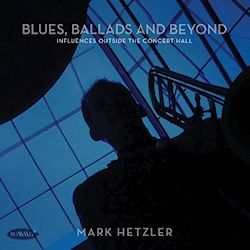 BUY NOW AmazonUK AmazonUS |
MARK HETZLER Blues, Ballads and Beyond
|
Mystic with a Credit Card (Michael Colgrass)
Javier’s Dialog (Dennis Llinas)
Improvisation No. 1 (Enrique Crespo)
Sonata for Trombone and Piano (Daniel Schnyder)
Night Set for Trombone and Piano (Robert Suderburg)
Doolallynastics (Bryan Lynn)
Sonata (Jack Cooper)
Mark Hetzler (trombone); Vincent Fuh (piano, keyboards); Buzz Kemper (narration); Anthony Di Sanza (precussion); Steve Kieve (marimba); Joseph Murfin (vibraphone); Brett Walter (vibes and gongs); Martha Fischer (piano); Todd Hammes (drums); Nick Moran (bass); Yorel Lashley (congas)
No recording details
Subtitled ‘influences outside the concert hall’, Mark Hetzler’s album doesn’t arrive with a definitive statement as to what this means because the trombonist is content to leave written descriptions of the works played to their composers. But it’s clear that there’s a nexus between the formal and the freewheeling, the notated and the improvised. There is a mosaic of influences and counter-influences at work in this selection.
Michael Colgrass’ Mystic with a credit card is an excerpt from his Brass Quintet and opens with a spoken text before a simple drone allows Hetzler to unleash an anguished blues-drenched solo full of quasi-Tricky Sam Nanton snarls, slurs and sobs. It’s the marimba, vibes and percussion that offer a sonic wash in Dennis Llinas’ Javier’s Diolog and its much lighter feel, conversational ease and free-spirited ebullience offers an immediate contrast. Though dexterously versed in the modern trombone idiom, Hetzler has clearly listened to older players and his wa-wa muted playing and chewy articulation reveals a sense of lineage at work. Written in 1983 Enrique Crespo’s Improvisation No.1 was crafted as an audition piece and it assuredly offers tests of tone, technique, temperament and range.
The three-movement Sonata by Daniel Schnyder for trombone and piano offers a classical form conveyed via jazz lexicon. The central movement is a vocalised song floating over a rich Blues seedbed and the finale is duly brief but exciting. The three-movement classical form is also explored by Night Set for trombone and piano by Robert Suderburg. Instructed to ‘Cry, Man’ – the title of the first part – the trombone does just that though the central panel is infused with a welcome wit and droll elements before the finale ushers in suave legato and sanctified ‘bone shouts and more wa-wa effects; all part of the versatile trombonist’s armoury. If you want a zippy, virtuosic work-out, Brain Lynch’s Doolallynastics should do the trick, if you can pronounce it, of course. There’s a plangent Melancholy Mood by John Stevens, originally written for trumpet. To finish there’s another sonata, this time by Jack Cooper, a work commissioned back in 1998, and which manages to fuse, classical, jazz and Afro-Latin elements. It’s a rhythmically vital but conspicuously clean-cut work, the highlight of which is the JJ Johnson homage in the central movement.
This wide-ranging album defies easy categorisation. It combines the rigour of sonata form with the freedom of the jazz tone poem, the languor and appeal of Latin elements with the righteous blowing of the sanctified. And throughout one can savour pockets of bravura, rich personalised tone and adventurous intelligence.
Jonathan Woolf